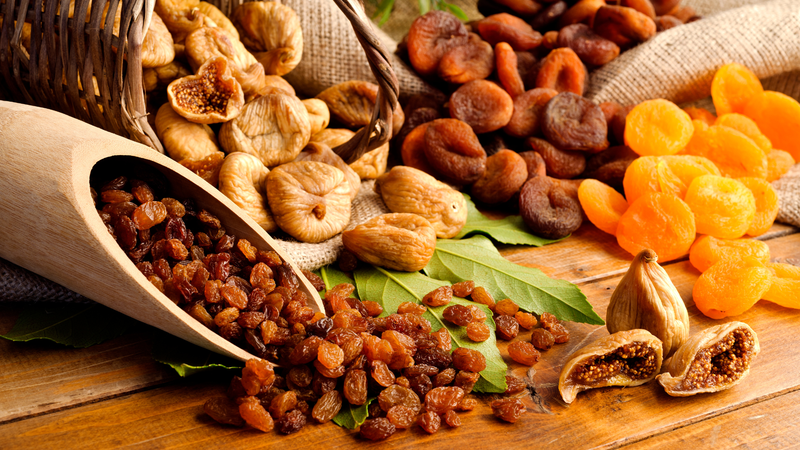Many people are concerned about whether eating a lot of dried fruit leads to weight gain. To answer this question, let’s analyze in detail the issues related to dried fruit in the article below!
Nutritional composition of dried fruit
Dried fruit is a source of vitamins and minerals that can be preserved year-round thanks to drying methods such as sun drying, using a dryer or an oven. Regardless of the method, the final product becomes a more nutritious, sweeter and more fragrant food.
A cup of mixed dried fruit (about 200g) contains:
- Fat: 0g;
- Calories: 480 kcal;
- Fiber: 8g;
- Carbohydrates: 112g;
- Protein: 4g;
- Sugar: 92g.
By weight, dried fruit contains 3.5 times more fiber than fresh fruit, along with important micronutrients such as vitamin A, vitamin C, calcium, iron and potassium. Different fruits have specific nutritional profiles. For example, raisins are rich in vitamin C and iron, while prunes provide lots of vitamin A.

Different types of dried fruits have specific nutritional compositions.
Health Benefits of Dried Fruit
Before finding out if eating dried fruit makes you fat, you should explore the health benefits that dried fruit can bring. Here are some typical benefits of dried fruit:
Good for the eyes
Vitamins A and C in dried fruit help prevent and slow down the process of macular degeneration and cataracts – common problems in the elderly.
Prevent osteoporosis
Calcium in fruits such as dried kiwis supports strong bones, especially necessary for the elderly to prevent osteoporosis.
Antioxidants
Dried fruits are a rich source of antioxidants, especially polyphenols, which help improve blood circulation, aid digestion, reduce oxidative damage to cells and the risk of disease.
Benefits of some popular dried fruits
Health benefits of dried fruits:
- Raisins: Rich in fiber and potassium, have a low glycemic index, help lower blood pressure, control blood sugar, and reduce the risk of heart disease.
- Dried plums: Known for their natural laxative effects, prunes contain sorbitol and fiber, which help improve constipation and digestive health. In addition, the antioxidants in prunes also prevent heart disease and cancer.
- Dates: Dried dates are an excellent source of fiber, potassium, and antioxidants, which help protect the body from oxidative damage. With a low glycemic index, dates are safe for people with diabetes when consumed in moderation.

Dried fruit has many valuable nutrients.
Does eating dried fruit make you fat?
The question of whether eating dried fruit makes you fat is raised because dried fruit often contains more calories than fresh fruit. This can make it easy to gain weight if consumed in excess. However, you will not gain weight if the amount of calories consumed does not exceed the amount of calories burned by the body. When portion control is reasonable, dried fruit not only helps maintain weight but also provides many nutrients, effectively supporting weight loss.
Dried fruit can be suitable for most diets, from weight loss, weight maintenance to weight gain. Because during the drying process, the water in the fruit is removed, causing calories by volume to increase significantly. For those who want to gain weight, adding dried fruit is a simple way to increase calories in the diet. On the contrary, if you are on a diet to lose weight, consuming too much dried fruit can slow down this process. Therefore, balancing the amount of dried fruit is very necessary.
In other words, dried fruit does not directly cause obesity or weight gain if you eat it in the right portion. A 2011 study published in the British Journal of Nutrition also showed that adding fruit to your diet helps reduce the risk of obesity. Dried fruit with high fiber content can increase the feeling of fullness, reduce cravings and support the weight loss process more effectively. Therefore, you do not need to worry about whether eating dried fruit makes you fat, but should learn how to use this food properly.

Is eating dried fruit fattening? This is a question many people have.
Some Risks of Eating Dried Fruit
High Sugar
Dried fruit contains high amounts of natural sugars, including glucose and fructose. Consuming too much fructose can lead to weight gain, increasing the risk of type 2 diabetes and heart disease. For example, the sugar content of some dried fruits:
- Raisins: 59%.
- Prunes: 64 – 66%.
- Dried apricots: 53%.
Added sugar
Some manufacturers add sugar or syrup to dried fruit to enhance flavor. Added sugars have been linked to obesity, heart disease and cancer. Therefore, check product labels to avoid dried fruits with added sugar.
Preservatives and Contamination Risks
Sulfites are added to dried fruit to make it last longer, but they can cause allergic reactions, especially in sensitive people. Additionally, if stored improperly, dried fruit can become contaminated with mold or toxins such as aflatoxin.
Tips for eating dried fruit
When eating dried fruit, you should pay attention to the following issues to ensure health safety:
- Choose products that do not contain added sugar or preservatives such as sulfites.
- Control your portion sizes, only eat small amounts to avoid consuming too many calories.
- Combine dried fruit with other foods in your meals to balance nutrition.

Dried fruit poses some health risks.
Dried fruit is a great choice for a balanced diet, providing many essential nutrients such as fiber, vitamins, minerals and antioxidants. So, does eating dried fruit make you fat? Because of its high calorie and natural sugar content, portion control is important to avoid weight gain and health risks. Enjoy the sweet taste of dried fruit in a healthy way to stay healthy and fit!





